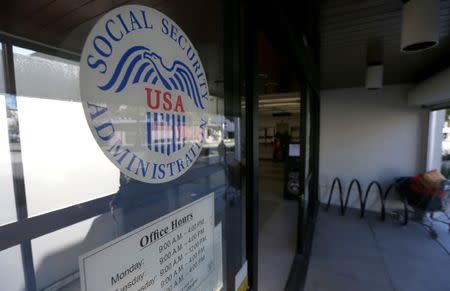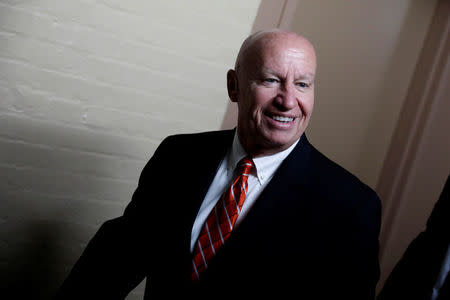Political risk looms over Republicans' welfare tinkering
By Susan Cornwell and Yasmeen Abutaleb WASHINGTON (Reuters) - Political danger signs are flashing, but conservatives in Washington are pushing forward with proposals to change America's social safety net, an agenda even fellow Republican President Donald Trump recently shied away from. Fresh from a tax overhaul victory and keen to act while they retain control of Congress, Republicans are seeking tougher work and job training requirements for those helped by assistance programs such as Medicaid and food stamps. Kentucky on Friday became the first U.S. state to get approval from Washington to impose work requirements on recipients of Medicaid, a government program that provides health coverage to millions of Americans, primarily the poor, children, pregnant women, elderly adults and disabled people. The approval came a day after the Trump administration said states could move toward putting work or job training conditions on Medicaid, which has never had such conditions attached. Democrats and health advocacy groups said such changes would make healthcare less accessible to vulnerable Americans. The Southern Poverty Law Center, a liberal group, said it plans to file a legal challenge against the administration. Changes like Kentucky's appeal to conservative Republican voters, although more broadly, Americans' strong views and personal stakes in U.S. social programs have long been seen as political dynamite - especially in election years. "That is fraught with danger, political danger," said John Feehery, a Republican strategist who served as spokesman to former Republican House Speaker Dennis Hastert. After the deep tax cuts for corporations that Republicans pushed through Congress in December, critics will say the party wants to "pay for it by slashing benefits to poor people. They just don't need that right now," Feehery said. In November, Republicans must defend their Senate and House majorities in nationwide midterm congressional elections, which historically produce big gains for the opposition in the first term of a new presidency. Trump said on Saturday after a meeting with Republican leaders that any welfare legislation should be bipartisan or wait until later in 2018 after other priorities such as infrastructure and immigration are addressed. Some House Republicans interpreted Trump's statement as ruling out overhauls of big programs such as Social Security and the Medicare program for the elderly, but leaving room for more modest initiatives such as stricter work requirements. RYAN'S AGENDA House Speaker Paul Ryan, the Republican Party's policy wonk in chief, has long advocated for some of the welfare changes that party colleagues are trying to decide how to package. "What we will see is perhaps a more focused approach, to a work requirement, instead of a comprehensive entitlement reform initiative," North Carolina Republican Representative Mark Meadows said in an interview. He is chairman of the House Freedom Caucus, a conservative faction. In an example of what such proposals invite, Democrats quickly attacked the administration's decision to let states proceed with Medicaid work requirements. "It's really sad. ... The elderly, disabled, pregnant women and children will all suffer," House Democratic Leader Nancy Pelosi told reporters. A person familiar with a meeting last weekend at Camp David, the president's mountain retreat in Maryland, between Trump and congressional leaders said some participants were wary of making "welfare reform" a Republican message. Still, polling in mid-2017 by the Kaiser Family Foundation found 70 percent of respondents favored work requirements for Medicaid for non-disabled adults. At the same time, 74 percent said they had a favorable view of Medicaid as it is now. House Agriculture Committee Chairman Mike Conaway, a Texas Republican, said the 2018 farm bill will including tighter work requirements for the Supplemental Nutrition Assistance Program (SNAP), better known as food stamps. He gave no details. House tax committee Chairman Kevin Brady, also a Texas Republican, said his panel is exploring ways to get workers who are "trapped in the welfare system ... off the sidelines." Representative Bradley Byrne, an Alabama Republican, said safety net programs are under review by a bipartisan group he co-chairs called the Opportunity Action Caucus. He said he hoped the group this month would propose ways for "able-bodied people who are presently on one or more of our welfare programs, to go out and get the skills and training they need to get a job." (Editing by Kevin Drawbaugh, Jonathan Oatis and Susan Thomas)



